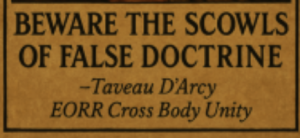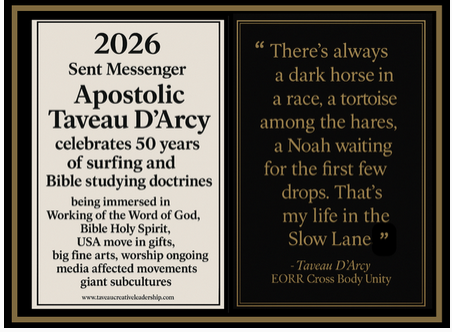
Part 1: Book of Acts Ministers
True Church vs. Occult-Style Ministry
Discerning the Spirit of Christ from the Spirit of Pride and Abuse
“Many will say, (and this is said by Jesus (notably) to the Book of Acts ,saved Christian ministers)
“Lord, Lord, didn’t we prophesy in Your Name? Didn’t we cast out devils in Your Name? Didn’t we do signs and wonders in Your Name? And He will say, “Depart from me, I never knew you, you who practices “lawlessness” (iniquity) “Strong’s Bible Concordance “Use False Authority” Matthew 7:21-23
(C)2025 Taveau D’Arcy All copyrights reserved under international copyright laws
Lesson 1: The Marks of a True Church vs. a Cult Ministry
Intro
Not all that calls itself “prophetic” or “Christian” reflects Christ. Some ministries adopt patterns that look more like cults or occult circles—exalting gifts, personalities, or forms—while ignoring Christ’s body life and holy fear.
Key Verses
James 2:1,9 – “Have not the faith of our Lord Jesus Christ… with respect of persons… if ye have respect to persons, ye commit sin.”
Acts 5:11 – “Great fear came upon all the church, and upon as many as heard these things.” (sober HOLY fear of the Lord)
Galatians 3:28 – “Ye are all one in Christ Jesus.”
False Marks
Respect of persons: only certain types are honored.
Elevating gifts over Christ.
Lack of holy fear—more afraid of losing status than offending God.
Ordinary saints, especially women, are dismissed.
True Church Marks
All are one in Christ.
Christ is the Head; every member is needed (1 Cor. 12:21).
Holy fear of God governs behavior.
The weak, small, and ordinary are valued.
Application
Ask: Do we honor all members equally? Do we walk in fear of God or fear of man?
Lesson 2: Old Testament Warning – Eli, His Sons, and Respect of Persons
Intro
Eli the priest gives us a sobering picture of leadership gone wrong—favoring his sons and dishonoring God. This mirrors how cult-like ministries protect their elites while ignoring God’s standards.
Key Verses
1 Samuel 2:12 – “Now the sons of Eli were sons of Belial; they knew not the Lord.”
1 Samuel 2:30 – “Them that honour me I will honour, and they that despise me shall be lightly esteemed.”
Isaiah 29:13 – “This people draw near me with their mouth… but have removed their heart far from me.”
False Practices
Eli’s tolerance of his sons’ abuse of the priesthood.
Protecting status instead of honoring God.
A culture of impunity for the “chosen few.”
True Model
Prophets like Samuel: faithful, impartial, listening to God.
Deborah and Huldah: women called and honored by God in authority.
God honors those who honor Him, not those who protect their turf.
Application
Ask: Are we covering sin to protect our favorites? Do we value God’s holiness above human relationships?
Lesson 3: The Spirit of Christ vs. Dangerous Spirits in Ministry
Intro
We must discern between the Spirit of Christ and false, dangerous spirits that masquerade in ministries. Jesus’ church is built on love, humility, and service. False ministries thrive on pride, intimidation, and elitism.
Key Verses
1 Cor. 13:2 – “Though I have the gift of prophecy… and have not charity, (Jesus heart of compassion ,empathetic real Love)I am nothing.”
John 7:24 – “Judge not according to the appearance, but judge righteous judgment.”
Matthew 25:40 – “Inasmuch as ye have done it unto one of the least of these… ye have done it unto me.”
Spirit of Christ
Humility, service, love.
Holy fear of God.
Fellowship in the light (1 John 1:7).
Honors all members equally.
Dangerous Spirits
Pride in gifts, superiority, intimidation.
Spectral evidence: accusations based on visions, suspicions, “readings.”
Control, exclusion, dishonor of women and ordinary saints.
No holy fear—fear of losing power instead of reverencing God.
Application
Test every spirit (1 John 4:1).
Guard against elitism in your own heart.
Return to Christ as the Head; gifts are grace, not weapons.
Closing Challenge for the Series
Cult/occult-style ministries may exalt seer gifts and control people, but they lack love, humility, and fear of God.
The true Church—born again in Christ—values every believer, from the least to the greatest, walking in reverence before God.
Let us reject abusive patterns and return to the simplicity of Christ.
“For we preach not ourselves, but Christ Jesus the Lord; and ourselves your servants for Jesus’ sake.” (2 Cor. 4:5).

SECOND SECTION:
The Seer Gift and Office: True Authority vs. Abuse
1. Introduction: The Rise of the “All-Knowing Seer”
-
In today’s charismatic world, “seer” gifting is highly emphasized. Many are sincerely called, but some fall into superior pride or abusive practices.
-
A true seer operates as a servant of Christ. A false seer uses gifting to intimidate, control, or elevate self.
-
This lesson draws from Scripture to separate authentic authority from soulish or abusive misuse.
2. The Seer Gift in the Bible
-
Old Testament Seers:
-
Samuel was called a seer (1 Sam. 9:9). He faithfully heard God and spoke truth without favoritism.
-
Elisha saw into the enemy’s plans (2 Kings 6:12) as God revealed it for protection—not to spy on men.
-
-
New Testament:
-
The term “seer” is not used, but the gift of prophecy, word of knowledge, and visions by the Spirit are affirmed (1 Cor. 12:7–10; Acts 10:9–11; Acts 21:10–11).
-
Christ is the Head; seers and prophets are servants (Eph. 4:11–13).
-
3. True Authority vs. False Superiority
True Seer Authority
-
Rooted in Christ’s lordship, not self (Col. 2:19).
-
Functions within Ephesians 4 purpose: equipping, building unity, maturing the body.
-
Operates in humility: “We preach not ourselves, but Christ Jesus the Lord; and ourselves your servants for Jesus’ sake.” (2 Cor. 4:5).
-
Accountability: submits to Scripture, Spirit, and the body.
-
Fruit: clarity, comfort, edification, repentance, protection.
False Seer Superiority
-
Rooted in pride: flaunts “accuracy,” demands respect, or guards turf.
-
Uses gift to intimidate, label, or exclude others.
-
Elevates personal insight above Scripture or above other leaders.
-
Produces fear, suspicion, division, or spiritual elitism.
-
Functions like Diotrephes, who loved preeminence (3 John 9).
4. The Abuse of Authority
-
Abuse occurs when:
-
Gift becomes a weapon to control rather than serve.
-
Prophetic words become diagnoses or accusations rather than encouragement.
-
Leaders build dependency on themselves instead of pointing people to Christ.
-
-
Jesus condemned this spirit: “The kings of the Gentiles exercise lordship… but ye shall not be so: he that is greatest among you, let him be as the younger; and he that is chief, as he that doth serve.” (Luke 22:25–26).
5. The Dangers of Pride in the Seer Office
-
Pride in gifts leads to blindness: “Knowledge puffeth up, but charity edifieth.” (1 Cor. 8:1).
-
Pride in authority leads to domination: “Neither as being lords over God’s heritage, but being ensamples to the flock.” (1 Pet. 5:3).
-
Pride in power leads to abuse: Simon the sorcerer sought power to lay hands and give the Spirit (Acts 8:18–20).
6. The Spirit of Christ vs. Dangerous Spirits
| Spirit of Christ | Dangerous False Spirit |
|---|---|
| Humility | Superiority & arrogance |
| Service | Control & intimidation |
| Edification | Accusation & suspicion |
| Fellowship (1 John 1:7) | Isolation, exclusion, “us vs. them” |
| Grace gift | Works, rituals, conjuring |
| Jesus-centered | Prophet-centered |

THIRD SECTION
Very Common These Last Days : One of the most urgent warnings the Church needs right now: when a ministry begins to act more like a cult or occult circle than the true Body of Christ. Let’s break it down with Bible depth, showing the contrast, and rooting it in Old and New Testament examples—including the role of women, authority, and “holy fear of the Lord.”
Cult, Occult, and the True Church of Christ
1. Marks of a Cult or Occult-Style “Christian” Ministry
-
Respect of Persons: They honor certain personalities, prophetic types, or “elite” members, while disregarding the ordinary believers.
-
“My brethren, have not the faith of our Lord Jesus Christ, the Lord of glory, with respect of persons… if ye have respect to persons, ye commit sin.” (James 2:1,9).
-
-
Control Through Gifts: They elevate certain seer, prophet, or apostle “forms” of gifting, making these the standard of holiness.
-
Lack of Holy Fear: Instead of reverence for God, they fear losing control, reputation, or influence.
-
“The fear of the Lord is the beginning of wisdom.” (Prov. 9:10).
-
-
Devaluing Ordinary Believers: Regular saints—especially women, strangers, or those without titles—are dismissed or ignored.
-
This directly contradicts the Spirit who says: “The eye cannot say unto the hand, I have no need of thee.” (1 Cor. 12:21).
-
2. Contrast with the True Born-Again Church
-
In Christ, all are valued: “There is neither Jew nor Greek, bond nor free, male nor female: for ye are all one in Christ Jesus.” (Gal. 3:28).
-
Jesus valued ordinary, overlooked people:
-
He honored the Samaritan woman (John 4).
-
He praised the widow’s two mites (Mark 12:42–44).
-
He defended Mary of Bethany for sitting at His feet (Luke 10:39–42).
-
-
The early church walked in holy fear:
-
“And great fear came upon all the church, and upon as many as heard these things.” (Acts 5:11, after Ananias and Sapphira).
-
This fear was reverence for God, not fear of men’s control.
-
3. Old Testament Example: Eli and Respect of Persons
-
Eli, the high priest, failed to discipline his sons who abused their priestly office (1 Samuel 2:12–17, 22–25).
-
He respected his own family’s status more than God’s holiness.
-
God judged him: “Them that honour me I will honour, and they that despise me shall be lightly esteemed.” (1 Sam. 2:30).
-
This mirrors cult-like ministries that protect their “chosen” while dishonoring God’s standards and ignoring the cries of regular people.

4. How Women Are Especially Diminished
-
In cult/occult ministries:
-
Women are often objectified, silenced, or only valued for service roles.
-
Their spiritual gifts are discounted unless they fit the leader’s mold.
-
-
In the true Body:
-
Deborah judged Israel with God’s authority (Judges 4:4).
-
Huldah was consulted as a prophetess by kings and priests (2 Kings 22:14).
-
Philip’s four daughters prophesied (Acts 21:9).
-
Women were the first witnesses of the resurrection (Luke 24:10).
-
Paul affirms women laboring in the gospel (Romans 16:1–7).
-
Christ Himself shattered man-made barriers: He received women disciples, defended them against scorn, and revealed Himself first to them after rising.
5. The Spiritual Danger: No Holy Fear
-
Cult/occult-style ministries exalt man’s gifting but lack trembling before God.
-
They practice spiritual elitism rather than humility.
-
They lose touch with the Head, Christ: “Not holding the Head, from which all the body by joints and bands having nourishment ministered… increaseth with the increase of God.” (Col. 2:19).
-
They despise ordinary believers, which is despising Christ Himself:
-
“Inasmuch as ye have done it unto one of the least of these my brethren, ye have done it unto me.” (Matt. 25:40).
-
6. Summary Admonition
-
A true church: values all believers, honors Christ, walks in holy fear, and sees each member as essential.
-
A cult/occult-style ministry: values only certain “gifted” types, exalts man, lacks holy fear, and despises ordinary saints—especially women.
-
Scripture is clear: respect of persons, spiritual intimidation, and abuse of gifts are sins that bring God’s judgment.
Closing Word
“Let us beware of ministries that exalt seer prowess but lack the fear of the Lord.
Any group that dishonors ordinary saints, despises women, or values only the ‘elite’ gifts is not walking in the Spirit of Christ. The true Church, bought by His blood, honors every member, from the weakest to the strongest, and bows in holy fear before the Lord of glory.”
TO SUPPORT
(C)2025 Taveau Creative Leadership all copyrights reserved in conjunction with AI

